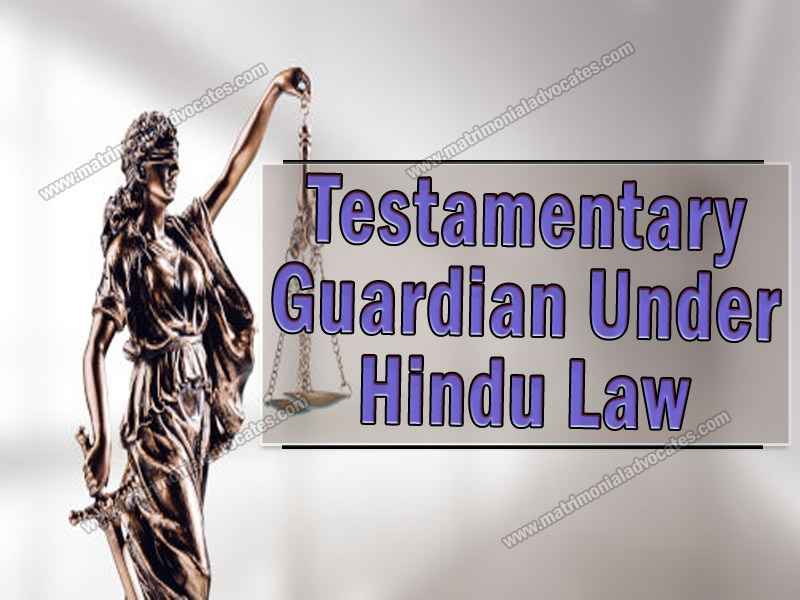
According to Section 4 of Hindu Minority and Guardianship Act, 1956 “Guardian” means a person having the care of a person of a minor or of his property or of both the person and his property. This includes: natural guardian, guardian appointed by the will (testamentary guardian), guardian appointed or declared by court, and a person empowered to act as such by the order of Court of Wards.
The present article is a discussion on the Testamentary Guardian or the guardian appointed by will.
CONCEPT
Testamentary Guardian is a guardian who is appointed by way of will. It is done to ensure that the child will have a guardian even after the death of the natural guardian who may require supervision over themselves or their estate. A testamentary guardian cannot act as a guardian if the natural guardians are alive.
When, during the British period, testamentary powers were conferred on Hindus, the testamentary guardians also came into existence. It was father’s prerogative to appoint testamentary guardians. By appointing a testamentary guardian the father could exclude the mother from her natural guardianship of the children after his death.
Under old Hindu Law a testamentary guardian appointed by father could function even though when the mother was alive. But according to Section 9, even though the father has appointed a guardian if the mother is alive, she would be his guardian, and she also can appoint under her will a guardian of her own choice.
Section 9 of the Hindu Minority and Guardianship Act, 1956, relates to the testamentary guardians and their powers. It states:
(1) A Hindu father entitled to act as the natural guardian of his minor legitimate children may, by will appoint a guardian for any of them in respect of the minor’s person or in respect of the minor’s property (other than the undivided interest referred to in section 12) or in respect of both.
(2) An appointment made under sub-section (1) shall have not effect if the father predeceases the mother, but shall revive if the mother dies without appointing, by will, any person as guardian.
(3) A Hindu widow entitled to act as the natural guardian of her minor legitimate children, and a Hindu mother entitled to act as the natural guardian of her minor legitimate children by reason of the fact that the father has become disentitled to act as such, may, by will, appoint a guardian for any of them in respect of the minor’s person or in respect of the minor’s property (other than the undivided interest referred to in section 12) or in respect of both.
(4) A Hindu mother entitled to act as the natural guardian of her minor illegitimate children may; by will appoint a guardian for any of them in respect of the minor’s person or in respect of the minor’s property or in respect of both.
(5) The guardian so appointed by will has the right to act as the minor’s guardian after the death of the minor’s father or mother, as the case may be, and to exercise all the rights of a natural guardian under this Act to such extent and subject to such restrictions, if any, as are specified in this Act and in the will.
(6) The right of the guardian so appointed by will shall, where the minor is a girl, cease on her marriage.
APPOINTMENT
Thus it is clear from section 9 of the Hindu Minority and Guardianship Act that the following persons have the power and authority to appoint a Testamentary Guardian:
(1) Father, natural on adoptive
(2) Mother, natural or adoptive
(3) The widowed mother, natural or adoptive.
Father :
- A Hindu father, who is entitled to act as a natural guardian and has not become disqualified to act as such, may by will appoint a guardian in respect of minor’s person or his property or both, but not of undivided interest of the minor in the joint-family property.
- The undivided interest of minor in a joint Hindu family remains in the hands of Karta. Hence no testamentary guardian can be appointed in respect of that. The father cannot supersede the power of the mother to act as a natural guardian by appointing a testamentary guardian in case he predeceases her but if the mother died without appointing any guardian, the appointment made by the father shall revive.
- Thus where the father dies during the life time of his wife (minor’s mother) after appointing a guardian by will, the appointment will not become effective and the mother by virtue of the provisions in Section 6 of the Act will become the natural guardian of the minor. But where the widowed wife, i.e., minor’s mother dies without appointing any person as guardian by will of the minor, the appointment made by the father will revive
Mother :
As natural guardian the mother has a superior right to guardianship. In fact she can herself by her will appoint another testamentary guardian who will look after her children and their property during their minority on her death. But if she dies without leaving such a will, the appointment of testamentary guardian by the father revives and such testamentary guardian can function.
Widowed Mother :
- A Hindu widowed mother entitled to act as the natural guardian of her legitimate children may by will appoint a guardian for any of them in respect of the minor’s person or separate property or both. Any appointment made by her husband will be of no effect on the face of the appointment made by the widow.
- Where the child is illegitimate, the mother being a natural guardian can appoint a guardian by will even during the life time of her husband. In such ease the father has not right to appoint any person as guardian.
- A Hindu mother entitled to act as the natural guardian of minor legitimate children could appoint a guardian by will during the life time of her husband provided he has ceased to be a Hindu or has become a sanyasi by renouncing the world. Similarly where the mother entitled to act as a natural guardian of her illegitimate children, may appoint a guardian by will either with respect of minor’s person or property or both.
- In such cases the presence of her husband is no bar nor is it necessary that he is disqualified to act as such because the father is not competent to act as a natural guardian of the minor children during the lifetime of their mother, who alone could exercise the right of appointing a guardian by will.
- There is nothing in the act which limits the choice of natural guardian to appoint any person as the guardian under a validly executed will. But the person so appointed must be one who is not suffering from any disqualifications like minority, renunciation of the world or being a non-Hindu or insanity.
POWERS OF TESTAMENTARY GUARDIAN
The powers of the testamentary guardian are defined by the will of the testator. He has the powers of a natural guardian subject to any restrictions that may have been imposed upon them by the will appointing him as’ testamentary guardian.
The testamentary guardian becomes entitled to act as the guardian of the minor after the death of the natural guardian. He can exercise all the rights and powers of a natural guardian to such extent and subject to such restrictions as are specified in the Act and in the will. Thus the powers of testamentary guardian and the natural guardian are the same except that the power of a testamentary guardian to deal with property belonging to the minor is also subject to the restrictions imposed by the will. Since the powers of the testamentary guardian are similar as that of natural guardian, it is relevant to know that Section 8 of the Hindu Minority and Guardianship Act, 1956 deals with the powers of the natural guardian. Section 8 lay down that the natural guardian has every power to do any act subject to the provisions of the law if necessary or found to be beneficial to the estate of the minor.
However it must be understood that under section 8 the powers of the natural guardians have been curtailed in regard to the making of alienations. In other respects their powers are still those recognized by the doctrine of “necessity or benefit.
So testamentary guardians can exercise the powers of natural guardians
- subject to the restrictions thereon under section 8 and
- further, subject to the directions in the will itself
In Ramanathan v. Palaniappa, AIR 1939 Mad. 531,
A executed a will appointing В as executor of the will and authorizing his (A’s) widow to adopt a son. Till the son became a major the executor was to manage the property which consisted of an ancestral money lending business.
The widow later on adopted a son. In the course of the business В appointed an agent for conducting the business borrowed from a Bank executing a promissory note along with C, each taking a half of the money. С had to pay the whole amount to the Bank. After paying the whole amount to the Bank, С sued the minor for contribution.
The minor’s plea was that В or his agent could not borrow so as to bind his estate. It was held that В was a testamentary guardian and had also powers of a natural guardian as defined in Hanuman Prasad’s case. The appointing of an agent for a business of the kind was held to be within the powers of a natural guardian under Hindu law.
REMOVAL OF TESTAMENTARY GUARDIAN
The section 39 of the Guardian and Wards Act, 1890 is not abrogated by the Hindu Minority and Succession Act, 1956 hence it stands a good law even today. Section 39 of the Guardian and Wards Act states certain grounds for the removal of a testamentary guardian.
1) If there is ill-treatment on part of the testamentary guardian towards the child.
2) If he fails to perform his assigned duties.
3) If he is incapable to perform his assigned duty.
4) Abuse of his trust.
5) If he acts in any way which is against any of the provisions of the Act.
6) Conviction in any case for any offense.
7) Having an adverse interest in the ward.
8) If he ceases to live within the local limits of the jurisdiction of the court, and
9) If he is insolvent or bankrupt.
In addition to these grounds, the Hindu Minority and Guardianship Act, 1956 prescribes the following grounds for disqualification :
(i) If he ceases to be Hindu, or
(ii) If he has completely renounced the world.
CONCLUSION
In a matter where the future of the child is of concern, the importance must be of the best interest of the child. Testamentary guardianship was introduced with a view to ensure that the child will have a guardian even after the death of the natural guardian who may require supervision over themselves or their estate. Hence testamentary guardianship is an important aspect of guardianship under Hindu law. It must also be understood that Guardianship is given to take care of any child and take decisions which are needed to be decided upon. Hence, the testamentary guardian can be removed or disqualified on certain grounds mentioned under the Guardians and Wards Act, 1890 and Hindu Minority and Guardianship Act, 1956.





